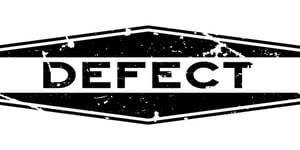 Let's face it – no one is perfect. Not even contractors. Construction defects occur, and contractors can be held liable for those defects.
Let's face it – no one is perfect. Not even contractors. Construction defects occur, and contractors can be held liable for those defects.
One significant lawsuit has the potential to put you out of business, which is why it's imperative that you understand potential construction defects, how to prevent those defects and potential lawsuits, and how to protect your business with the right Contractors Insurance.
What is a Construction Defect?
Modern Contractor Solutions magazine defines a construction defect as "a defect in the design, the workmanship, and/or in the materials or systems used on a project that results in a failure of a component part of a building or structure and causes damage to person or property, usually resulting in financial harm to the owner." Construction defects can lower a home's value and can even cause bodily injury or property damage.
Construction defects come in many forms. A defect can be as simple as an improperly painted room or as complicated as a foundation that affects the structural integrity of the building.
Some of the most common and most costly construction defects include the following:
- Structural Integrity
- Mechanical
- Electrical
- Doors, windows, and glass
- Finishes
According to FindLaw, courts typically categorize construction defects into four categories:
- Design Deficiencies, which typically relate to "building outside of a specified code." For example, a poorly designed roof can cause water penetration, poor drainage, etc.
- Material Deficiencies are the use of inferior building materials. For example, using cheap windows that – even when properly installed – leak.
- Construction Deficiencies is poor quality workmanship that can lead to several issues, such as water infiltration, cracks, plumbing leaks, pest infestation, etc.
- Subsurface Deficiencies are the lack of a solid foundation. For example, subsurface conditions that are not properly compacted and prepared for adequate drainage can lead to a structure moving or shifting, flooding, etc.
And there are two types of defects – patent and latent. A patent defect is an obvious flaw that can be easily seen, such as a crack in the foundation or flaking stucco. In contrast, latent defects are hidden issues that aren't as easy to identify, such as plumbing that is improperly installed that causes leaks and damage. These defects may not be evident until well after a project has been completed.
Anyone who works on a project – contractors, subcontractors, developers, suppliers, architects, and engineers - can be held liable for construction defects. Laws regarding construction defects are complicated and vary by state.
Currently, in Pennsylvania, the statute of limitations on construction defects is two years from discovery, and the statute of repose is 12 years after completion of construction. Lawyers.com explains, "A statute of limitations sets a lawsuit-filing time limit based on when the potential plaintiff suffered harm, a statute of repose sets a deadline based on the mere passage of time or the occurrence of a certain event that doesn't itself cause harm or give rise to a potential lawsuit."
How to Limit Liability
"An ounce of prevention is worth a pound of cure" is a well-known proverb that certainly applies when it comes to liability. Your first goal should always be to prevent liability by taking the following measures:
- Draft well-crafted contracts that set expectations
- Fulfill the terms of the contract
- Keep schedules realistic
- Provide quality workmanship
- Hire reliable and competent subcontractors
- Perform and document periodic inspections
- Keep communication professional and reasonable
- Ensure everyone working on the project is adequately insured
How to Protect Your Business
Sometimes, despite all of your best efforts, errors do occur, which is why the right insurance is crucial to any construction company's success. The following types of insurance can help protect your business from construction defects:
- General Liability Insurance – covers injuries (other than employees), property damage, libel, and slander
- Completed Operations Liability Insurance – covers a completed job or service
- Professional Liability Insurance – covers lawsuits related to failure to deliver services, negligence, and errors and oversights
- Builder's Risk Insurance (sometimes called Course of Construction Insurance or Inland Marine coverage) – covers damage that occurs while a building is under construction
Get the Right Contractors Insurance and Start Saving
The independent insurance agents at American Insuring Group specialize in Contractors Insurance, so they can 1) ensure you have the right coverage and 2) ensure you pay the lowest price for that coverage by shopping the market extensively for you.
Give us a call today at (800) 947-1270 or (610) 775-3848, or connect with us online for a free estimate.







